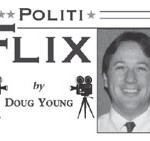(Personal Note: I am so happy and proud to introduce you all to the work of Doug Young. Doug has written reviews for “The Colorado Statesmen” in Denver, Colorado. He has twice won first place
awards for his film reviews in the Colorado Press Association’s Better Newspaper Contest. Doug always, always makes me smile – he has a unique way to look at movies assaulting our limited attention spans and slices, dices them up in manner that is uniquely a reflection of his special talents. Doug Young’s day-job is working as an environmental advisor for Colorado Governor John Hickenlooper. His reviews here are courtesy of The Colorado Statesmen and I thank them most appreciatively because I think more people should be enjoying Doug’s work. Doug Young, by the way, is a serious power pop geek)
Calculating a filmic hit
Moneyball
Starring Brad Pitt, Jonah Hill, Philip Seymour Hoffman, Robin Wright;
directed by Bennett Miller
An analysis of whether this film is a hit or a miss can be expressed by the following formula:
Let ![]() represent Brad Pitt (the lead actor Moneyball where he portrays Billy Beane, the general manager of the Oakland A’s baseball team during the 2002 season) as the inclusion of Pitt can be circular; on the one hand, as a big star, he can be a critical player in getting people to attend the film, and because he has the stature to even get this sort of film made. Yet his presence is also a wildcard as we do not know if he is bringing his more creative and independent spirit to the game, or if he is simply parlaying his appeal. In the case of Moneyball, it actually helps as he brings a boyish, enthusiastic charm to the role of a general manager of a ball club. He is someone who is exasperated by the budget constraints he has to work within and is intrigued by finding another way to recruit players and develop a winning strategy — using a computer model based on players statistics as opposed to the old “crystal ball” method of baseball scouts.
represent Brad Pitt (the lead actor Moneyball where he portrays Billy Beane, the general manager of the Oakland A’s baseball team during the 2002 season) as the inclusion of Pitt can be circular; on the one hand, as a big star, he can be a critical player in getting people to attend the film, and because he has the stature to even get this sort of film made. Yet his presence is also a wildcard as we do not know if he is bringing his more creative and independent spirit to the game, or if he is simply parlaying his appeal. In the case of Moneyball, it actually helps as he brings a boyish, enthusiastic charm to the role of a general manager of a ball club. He is someone who is exasperated by the budget constraints he has to work within and is intrigued by finding another way to recruit players and develop a winning strategy — using a computer model based on players statistics as opposed to the old “crystal ball” method of baseball scouts.
Multiply ![]() by
by ![]() (which represents the film’s director, Bennett Miller). This player in Moneyball is a multiplier as he is known for his great effort in the previous film Capote, which, like this one, showcases the obstacles encountered by the main character as he strives to accomplish his goals and be successful (in Capote it was writing the innovative and, at the time, path-breaking
(which represents the film’s director, Bennett Miller). This player in Moneyball is a multiplier as he is known for his great effort in the previous film Capote, which, like this one, showcases the obstacles encountered by the main character as he strives to accomplish his goals and be successful (in Capote it was writing the innovative and, at the time, path-breaking
“non-fiction novel” called “In Cold Blood,” and here it’s to create a team using unconventional
computation methods). This element is also expressed as an exponent as this director runs with an artistic, contemline by going for showy, clichéd sports action. Instead, he aims for the fence by
producing a nostalgic, rarefied air that is an intelligent and realistic depiction of the behind the scenes machinations of professional team sports. It also helps that he brings out the pinch hitter from Capote, award-winning Philip Seymour Hoffman, who here plays the irascible manager who cracks bats over the baseline changes to the lineup and positions that Pitt’s manager insists upon
making.
Added to this is the square root of two elements that are subtracted from each other: the actor Jonah Hill (represented by “jh ”) and the “sports film” (represented by “spf ”). Jonah Hill has
heretofore been a broadly comedic actor generally not known for serious, artistic and alternative fare. His appearance here on the field could leave critics cold, or he could be a unique ringer that helps showcase his adeptness at playing awkward characters who are dismissed for their looks and geeky mannerisms only to be under-appreciated as the smartest guy in the room. Furthermore,
since he appears on the roster with others in a sports film, this could also be a liability. As
Moneyball is about the struggles of a baseball team, you might expect this to be filled
with motivational locker room speeches, thrilling comebacks, the final big game, last minute infusions of self confidence among players, domestic distractions, desperate and alcoholic coaches, and egotistical and money mad owners. But you should check those expectations at the turnstile. This film does not play into the standard sports film playbook. Although there is real drama and
excitement here, that is the result of morerealistic elements based on players’ strengths and the resistance encountered when trying to employ new things in a setting that is steeped in strong traditions and expectations.
Added to this is the fraction ![]() , which represents a small piece of the film The Curious Case of Benjamin Button. Moneyball employs a similar play that was used in Button, which also featured the star player Brad Pitt, whereby Pitt’s character is seen as a young man, an adolescent, and a
, which represents a small piece of the film The Curious Case of Benjamin Button. Moneyball employs a similar play that was used in Button, which also featured the star player Brad Pitt, whereby Pitt’s character is seen as a young man, an adolescent, and a
middle-aged man during all innings of the film. This age progression (here showing Pitt’s manager character encountering the struggles to make it as a ballplayer when he was younger, which then later informs his understanding of the game and the pressures that players endure and thus helps
define the choices and risks he takes later as the team’s manager) recalls the age progression of the previous Pitt film (albeit in the case of the Button game, his age progression was more pronounced into old age and in reverse!).
The equation is then multiplied by the integral ![]() where the parameters are defined by “t,” “s” and “n”, which represent the film The Social Network, and the summation “
where the parameters are defined by “t,” “s” and “n”, which represent the film The Social Network, and the summation “![]() ”, where “as ” represents the writer Aaron Sorkin. These variables are included as Moneyball has the look and feel of that
”, where “as ” represents the writer Aaron Sorkin. These variables are included as Moneyball has the look and feel of that
previous film. In The Social Network, the main player developed a new and innovative approach to computer dating and networking that created immediate success, but resulted in protracted battles with competitors and traditional systems and institutions (educational, legal, and technological).
His passion to create and parlay this new approach also created friction with his friends and colleagues, resulting in hisbecoming alienated from these former teammates.
The film also had a particular clinical look using washed out green and grey colors. Moneyball has a similar narrative structure and coloring. Pitt’s manager character bucks the traditional method of
composing a team in order to create what he hopes will be a winning roster (which he does and the team succeeds with a historic winning streak), but he creates friction with his colleagues and the existing power structures around the game. Ultimately, he shakes things up enough that his ideas are incorporated into the game (at least in some sense). Furthermore, both films avail themselves
of the same hard-hitting player — writer Aaron Sorkin. He brings great dialogue and intelligence to the game plan of both films.
Of course, trying to calculate a critical cinematic “hit” using a computer algorithm such as this is innovative and yet fraught with peril and likely to encounter resistance. After all, like baseball and the overall message of Moneyball, composing a winning critical assessment is the result of luck, gut reaction and chemistry as much as it is based on objective criteria and past performance. Nevertheless, running the calculations (as well as the film itself), all of the elements on the left
side of the formula do in fact work together to equal the right side of the equation, which is
the critical equivalent of a grand slam (represented by “![]() ”).
”).
And the crowd goes wild!





I just bought this movie last week and as a serious baseball fanatic since the age of 5, I thoughbt it was very interesting and well done. I admit that I did not read the book. I enjoyed it but I don’t know how far reaching that admiration would be from non baseball or sports fans. My wife enjoys baseball and she liked the movie too.